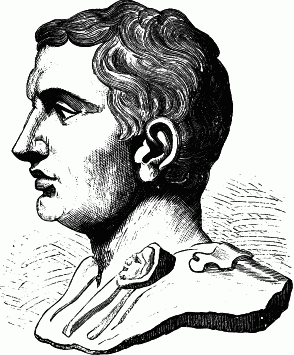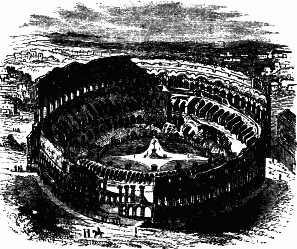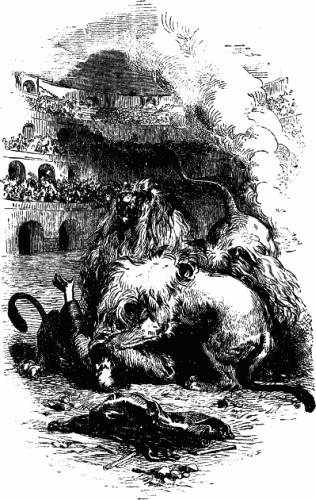
Pompeius was coming home for his triumph, every one had hopes from him, for things were in a very bad state. There had been a great disturbance at Julius Cæsar's house. Every year there was a festival in honor of Cybele, the Bona Dea, or Good Goddess, to which none but women were admitted, and where it was sacrilege for a man to be seen. In the midst of this feast in Cæsar's house, a slave girl told his mother Aurelia that there was a man among the ladies. Aurelia shut the doors, took a torch and ran through the house, looking in every one's face for the offender, who was found to be Publius Clodius, a worthless young man, who had been in Catilina's conspiracy, but had given evidence against him. He escaped, but was brought to trial, and then borrowed money enough of Crassus the rich, to bribe the judges and avoid the punishment he deserved. Cæsar's wife, the sister of Pompeius was free of blame in the matter, but he divorced her, saying that Cæsar's wife must be free from all suspicion; and this, of course, did not bring her brother home in a friendly spirit to Cæsar.

Pompeius' triumph was the most magnificent that had ever yet been seen. It lasted two days, and the banners that were carried in the procession, bore the names of nine hundred cities and one thousand fortresses which he had conquered. All the treasures of Mithridates—statues, jewels, and splendid ornaments of gold and silver worked with precious stones—were carried along; and it was reckoned that he had brought home 20,000 talents—equal to £5,000,000—for the treasury. He was admired, too, for refusing any surname taken from his conquests, and only wearing the laurel wreath of a victor in the Senate.
Pompeius and Cæsar were the great rival names at this time. Pompeius' desire was to keep the old framework, and play the part of Sulla as its protector, only without its violence and bloodshed. Cæsar saw that it was impossible that things should go on as they were, and had made up his mind to take the lead and mould them afresh; but this he could not do while Pompeius was looked up to as the last great conqueror. So Cæsar meant to serve his consulate, take some government where he could grow famous and form an army, and then come home and mould everything anew. After a year's service in Spain as proprætor, Cæsar came back and made friends with Pompeius and Crassus, giving his daughter Julia in marriage to Pompeius, and forming what was called a triumvirate, or union of three men. Thus he easily obtained the consulship, and showed himself the friend of the people by bringing in an Agrarian Law for dividing the public lands in Campania among the poorer citizens, not forgetting Pompeius' old soldiers; also taking other measures which might make the Senate recollect that Sulla had foretold that he would be another Marius and more.
After this, he took Gaul as his province, and spent seven years in subduing it bit by bit, and in making two visits to Britain. He might pretty well trust the rotten state of Rome to be ready for his interference when he came back. Clodius had actually dared to bring Cicero to a trial for having put to death the friends of Catilina without allowing them to plead their own cause. Pompeius would not help him, and the people banished him four hundred miles from Rome, when he went to Sicily, where he was very miserable; but his exile only lasted two years, and then better counsels prevailed, and he was brought home by a general vote, and welcomed almost as if it had been a triumph.
Marcus Porcius Cato was as honest and true a man as Cicero, but very rough and stern, so that he was feared and hated; and there were often fierce quarrels in the Senate and Forum, and in one of these Pompeius' robe was sprinkled with blood. On his return home, his young wife Julia thought he had been hurt, and the shock brought on an illness of which she died; thus breaking the link between her husband and father.

Pompeius did all he could to please the Romans when he was consul together with Crassus. He had been for some time building a most splendid theatre in the Campus Martius, after the Greek fashion, open to the sky, and with tiers of galleries circling round an arena; but the Greeks had never used their theatres for the savage sports for which this was intended. When it was opened, five hundred lions, eighteen elephants, and a multitude of gladiators were provided to fight in different fashions with one another before thirty thousand spectators, the whole being crowned by a temple to Conquering Venus. After his consulate, Pompeius took Spain as his province, but did not go there, managing it by deputy; while Crassus had Syria, and there went to war with the wild Parthians on the Eastern border. In the battle of Carrhæ, the army of Crassus was entirely routed by the Parthians; he was killed, his head was cut off, and his mouth filled up with molten gold in scorn of his riches. At Rome, there was such distress that no one thought much even of such a disaster. Bribes were given to secure elections, and there was nothing but tumult and uproar, in which good men like Cicero and Cato could do nothing. Clodius was killed in one of these frays, and the mob grew so furious that the Senate chose Pompeius to be sole consul to put them down; and this he did for a short time, but all fell into confusion again while he was very ill of a fever at Naples, and even when he recovered there was a feeling that Cæsar was wanted. But Cæsar's friends said he must not be called upon to give up his army unless Pompeius gave up his command of the army in Spain, and neither of them would resign.

Cæsar advanced with all his forces as far as Ravenna, which was still part of Cisalpine Gaul, and then the consul, Marcus Marcellus, begged Pompeius to protect the commonwealth, and he took up arms. Two of Cæsars great friends, Marcus Antonius and Caius Cassius, who were tribunes, forbade this; and when they were not heeded, they fled to Cæsar's camp asking his protection.
So he advanced. It was not lawful for an imperator, or general in command of an army, to come within the Roman territory with his troops except for his triumph, and the little river Rubicon was the boundary of Cisalpine Gaul. So when Cæsar crossed it, he took the first step in breaking through old Roman rules, and thus the saying arose that one has passed the Rubicon when one has gone so far in a matter that there is no turning back. Though Cæsar's army was but small, his fame was such that everybody seemed struck with dismay, even Pompeius himself, and instead of fighting, he carried off all the senators of his party to the South, even to the extreme point of Italy at Brundusium. Cæsar marched after them thither, having met with no resistance, and having, indeed, won all Italy in sixty days. As he advanced on Brundusium, Pompeius embarked on board a ship in the harbor and sailed away, meaning, no doubt, to raise an army in the provinces and return—some feared like Sulla—to take vengeance.
Cæsar was appointed Dictator, and after crushing Pompeius' friends in Spain, he pursued him into Macedonia, where Pompeius had been collecting all the friends of the old commonwealth. There was a great battle fought at Pharsalia, a battle which nearly put an end to the old government of Rome, for Cæsar gained a great victory; and Pompeius fled to the coast, where he found a vessel and sailed for Egypt. He sent a message to ask shelter at Alexandria, and the advisers of the young king pretended to welcome him, but they really intended to make friends with the victor; and as Pompeius stepped ashore he was stabbed in the back, his body thrown into the surf, and his head cut off.